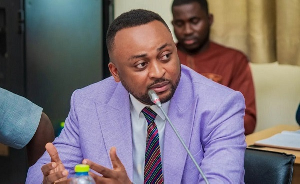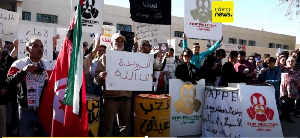Accra, May 3, GNA - United Nations Secretary-General Ban Ki-moon, on Tuesday said press freedom was among the most powerful vehicles for exposing misdeeds and upholding public trust.
In a message to commemorate World Press Freedom Day, Ban said: "When governments repress their people and shield themselves from scrutiny, press freedom is among the most powerful vehicles for exposing misdeeds and upholding public trust." "When people face discrimination and marginalisation, access to media can give them voice and create a shared awareness of their plight.
"And in an era of pressing global challenges, the free exchange of information and ideas through the media can connect people and countries in networks of common cause," he added. World Press Freedom Day has its roots in the African journalists who, in the wake of the fall of the Berlin Wall and the crumbling of media restrictions in Eastern Europe, sought similar advances on their continent.
They worked with UNESCO to organise the 1991 Seminar in Namibia that produced the landmark Windhoek Declaration on free and independent media, which in turn inspired the UN General Assembly two years later to proclaim this observance.
Today, it is the peoples of North Africa and the Middle East mobilising for their democratic rights and freedoms -- and doing so with a heavy and creative reliance on the Internet and social media to help spur change in their societies.
The theme of this year's observance: 93New Frontiers, New Barriers," highlights this dramatically changed global media landscape.
New media and tools such as cell phones continue to empower individuals, enrich news-gathering and illuminate once-largely-hidden workings of government, business and industry.
Yet alongside these benefits stand old challenges such as the use of media to disseminate hatred and incite violence. There are also undeniable new barriers being imposed by States, including cyber-surveillance, digital harassment and censorship on the internet. According to the Committee to Protect Journalists, at least six journalists who worked primarily online were killed in 2010. And in 2008, for the first time, more 93online reporters," were in jail than those working in traditional media.
"On World Press Freedom Day, let us remember the journalists, editors and other media professionals who have been killed for their reporting. And let us honour their memory by pursuing justice." "The impunity that often follows such murders suggests a disturbing lack of official concern for the protection of journalists, and outright contempt for the vital role they play. Many other journalists languish in jail simply for doing their jobs." "On this Day, as we mark the 20th anniversary of the Windhoek Declaration, let us also pledge to bridge the digital divide, so that all people can benefit from access to and use of new media and communication technologies," Ban added.
Article 19 of the Universal Declaration of Human Rights proclaims the right of all people to 93seek, receive and impart information and ideas through any media and regardless of frontiers". "Let us reaffirm our commitment to this bedrock principle of democracy, development and peace," Ban said.
In another development, UN Secretary-General, UN High Commissioner for Human Rights and UNESCO Director-General have on the occasion of World Press Freedom Day, May 3, have issued a joint message. The message by Ban Ki-moon, United Nations Secretary-General, Navi Pillay, United Nations High Commissioner for Human Rights and Irina Bokova, UNESCO Director-General said 93On this 2011 World Press Freedom Day, we call on all governments to join forces with the United Nations to guarantee and to promote freedom of expression in print, on the airwaves, and online."
It said 9320 years on after the Windhoek Declaration, the media landscape has changed beyond recognition, but our objective remains the same: to promote freedom of expression as the foundation for human dignity and the cornerstone of democracy".
"Our times feature great paradox. We enjoy unprecedented opportunities for expression thanks to new technologies and media. More and more people are able to share information and exchange views, within and across national borders.
"This is a blessing for creativity, for healthy societies, for including everyone in new forms of dialogue.
"At the same time, new threats are arising. In a context of rapid change, these combine with older forms of restriction to pose formidable challenges to freedom of expression. New measures to block, filter and censor information emerge every day. Challenges take different features, but they share the same face as violations of a fundamental human right.
"The United Nations is dedicated to ensuring that the internet becomes a truly global public resource, to which all have access and where all voices are heard. This underlines the importance of quality content.
"This calls for ac tion to defend the integrity and safety of online reporters. All principles of freedom of expression must be brought to the on-line world.
"And they must be protected. Over the last decade, more than 500 journalists lost their lives in the pursuit of their profession. 60 killings were reported worldwide in 2010 alone. Every week brings more reports of journalists and bloggers suffering from intimidation and violence.
"Violations of fundamental human rights cannot go unanswered. State authorities must do everything to counter impunity and to protect the safety of journalists. We will never forget the courage of journalists who paid with their lives for our right to know. "The media revolution is triggering new debates about freedom of expression, about the nature of regulation, about the balance between expression and responsibility. We must not shy away from exploring all angles of these questions. We must all rise to the occasion and accept the responsibility of change.
"Twenty years after Windhoek, events every day show that promoting freedom of expression remains as important as ever." World Press Freedom Day was born 20 years ago in the vision of a group of journalists gathered in Windhoek, Namibia. The Windhoek Declaration was a call to arms to protect the fundamental principles of the freedom of expression as enshrined in Article 19 of the Universal Declaration Human Rights. It was also a bell ringing in change across the world. 3 May 11
General News of Tuesday, 3 May 2011
Source: GNA












